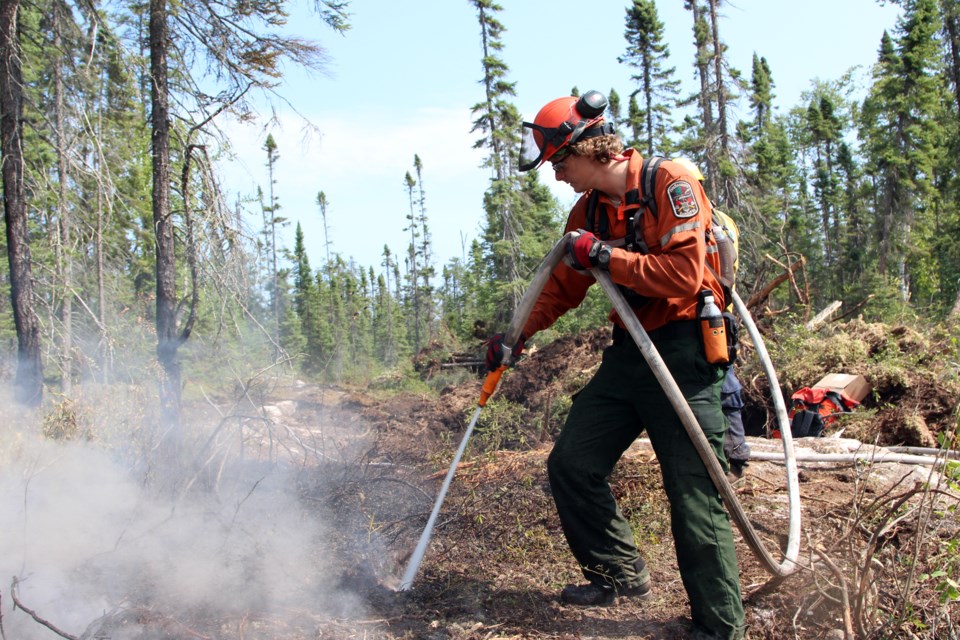A former fire management technician with Ontario's Aviation, Forest Fire and Emergency Services recently quit her job, adding to growing concerns that experienced staff at all levels of the province’s wildfire control program are leaving.
“What would you pick: a job in fire for $56,000 a year or work in a mine for $115,000 a year working four on and four off?” asks Paige Molholland, in reference to working for AFFES, the branch of the province’s Ministry of Northern Development, Mines, Natural Resources and Forestry that protects communities and wildlands from fire outbreaks.
In her resignation letter to the program’s upper management, Molholland advises technicians like herself are absorbing larger responsibilities while receiving the same pay as crew leaders that have fewer duties.
“With the turnover all over this organization, techs that are experienced are getting more put on their plates,” she says. “We’re taking on workloads that are almost impossible to fill during busy fire seasons and they are taken away from their work for fire. We are continuously bringing our work home and for what? Again, minimal pay.”
Molholland was part of the program for 11 years, making $28 an hour when she put in her two-week notice in late April.
As part of her duties, she was a Sector Response Officer, sometimes working upwards of 19 consecutive days for 12 to 16 hours at a time. While she understands it’s what she signed up to do, Molholland feels the work-life balance wasn’t compensated appropriately.
“They say there is a good work-life balance in this organization, yet I am not too sure where that is,” she says. “I have missed many family things like birthdays, weddings, and anniversaries for fire. I do understand that we are emergency services — and yet again we miss all these important events for a job that pays pennies.”
Just how prepared is the province for an active forest fire season? Fortunately, this year has been quiet.
Former Thunder Bay-Atikokan MPP Judith Monteith-Farrell, an NDP candidate who was recently defeated in the 2022 provincial election, says it's a concern.
“The aviation side of things is a huge cost,” she says. “There are big contracts there, but there’s a limited number of companies that do that work and provide those aircraft. I heard they were not happy this year because they weren’t given a real commitment. My concern is they’re going to scramble or threaten to pull out – then we’re going to be paying even more.”
Monteith-Farrell has spoken with several retirees from the program and has echoed many of their calls for action during her time in the Legislature.
She says these concerns have created a public safety issue.
“We don’t want to be sending workers into dangerous situations where there isn’t anyone on the ground or in management making the calls that are keeping them safe,” she says. “We have to make sure those contracted services are in place. What we need right now is a real honest look at it, and then making sure we have the human resources to carry out the plans.”
Monteith-Farrell says staffing issues aren't surprising.
“As time went on, the pay didn’t keep up, it wasn’t competitive,” she said. “It was one of the lower paying ministries. For comparable jobs in other ministries, people just left.”
The Ontario Public Service Employees Union, which represents well over 100,000 employees across a number of public sectors, includes the fire rangers and the MNRF.
SooToday reached out to the union for comment, and OPSEU president JP Hornick issued the following statement regarding some of the fire rangers' demands:
"I can say with certainty that OPSEU/SEFPO supports the fire rangers as we support all front-line workers in the MNRF and across government. The appropriate voices to listen to about woodland firefighting — as well as the changes the firefighters need — are the workers themselves with direct expertise and experience. They are literally the ones on the front lines risking their lives to protect our provincial resources and us. I understand that these members have legitimate concerns about how they achieve what they need to do this work, and I've reached out to the leaders of the union locals to start planning together toward that shared goal. The provincial government needs to value the work of our fire rangers, and their importance in keeping Ontario safe and protecting our natural resources."
In a statement issued to SooToday, a spokesperson with the MNRF says the ministry recognizes the challenges it is facing with staff retention but explains they're prepared to respond to wildfires in the province.
"The Ministry of Northern Development, Mines, Natural Resources and Forestry (NDMNRF) has been actively preparing for the wildland fire season and is ready to respond to wildland fires and other natural resource emergencies in Ontario," the statement reads. "Ontario has a sophisticated response and operations system that allows us to place resources as needed to respond to wildland fires in a timely and efficient manner. These resources consist of fire crews, helicopters, water bombers, support personnel, and equipment."
The ministry points out that Ontario, and other jurisdictions, are experiencing challenges with the availability of skilled and experienced candidates for wildland firefighter positions and it is exploring recruitment and retention strategies.
"As with any other fire season, we have mutual aid partnerships set up in Ontario with municipalities and Indigenous communities, with other Wildland Fire Management agencies across Canada, and with the United States to assist and support when resource levels in Ontario are challenged. These agreements can supply additional firefighters, overhead fire management specialists, aircraft, and equipment as needed to support wildland fire response in Ontario," states the NDMNRF.
Alex Flood is a reporter for Village Media's SooToday.com



